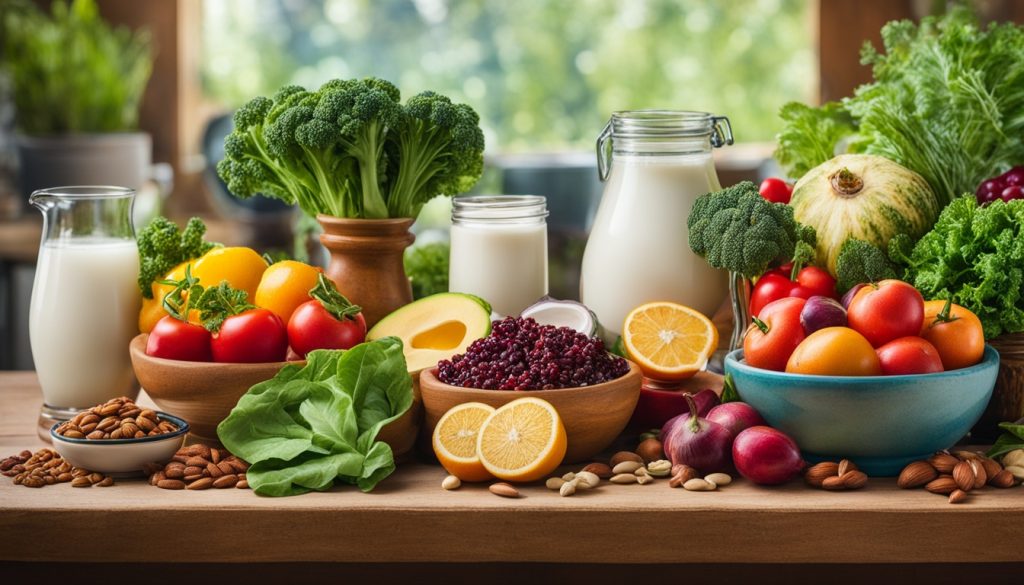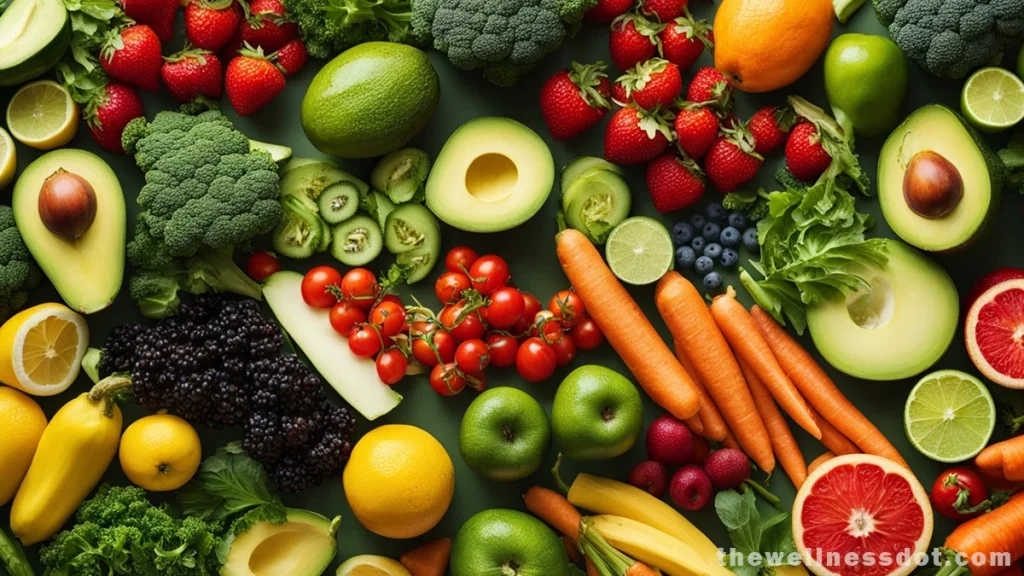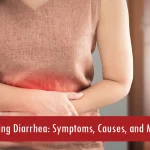Picture waking up filled with energy, ready for the day. You have your first drink, hoping to start your digestion right. But something’s not right. You feel uncomfortable and your stomach is upset. This happens often, which affects your mood, work, and happiness. You’re searching for a real change, not just a quick fix. You want to really better your digestion and feel great again.
The secret might be the gut health diet. It helps your gut work at its best, keeps the right balance of bacteria, and supports your whole intestinal system. In this part, we’ll talk about why a gut health diet is so important. Plus, we’ll show you how the right foods can make your digestion much better.
Table of Contents
Key Takeaways:
- A gut health diet can address digestive issues and improve overall well-being.
- The right foods can promote optimal gut function and maintain a balanced gut flora.
- A gut health diet is crucial for supporting intestinal health and optimizing gut microbiome.
- The gut health diet emphasizes nutrition and dietary choices that benefit digestive wellness.
- By implementing a gut health diet, you can experience improved digestion, enhanced nutrient absorption, and boosted immunity.
The Benefits of a Gut Health Diet
A gut health diet offers many benefits. It involves eating foods good for the gut and forming healthy habits. This way, you can better your gut health and feel healthier overall.
Improved Digestion and Nutrient Absorption
Eating right aids in better digestion and absorbing nutrients. Foods like fruits, veggies, and whole grains with fiber are key. They help your body process food well and avoid problems like constipation. A nutrient-rich diet also ensures your body gets the vitamins and minerals it needs.
Enhanced Immunity
Your gut health and immune system work closely together. A healing diet for the gut helps make your immune system stronger. This is because the gut’s bacteria and other tiny organisms help control the immune system. Eating foods packed with nutrients and probiotics, like yogurt, can keep your gut healthy and help your immune system work better.
Mental Well-Being
A gut health diet affects not only your body but also your mind. New studies show a strong link between gut health and brain health. Keeping your gut healthy with good food can help keep your brain in top shape. This reduces the chance of mental health issues.
To really boost your gut health, focus on a diet full of gut-friendly foods and good eating habits. Choosing nutritious foods can change how well your gut, immune system, and your overall health works. It’s all about eating the right foods to feel your best.
Understanding the Gut Microbiome
The gut microbiome is a complex system of tiny organisms in your digestive system. It is crucial for good digestive health and overall well-being. The good bacteria help with digestion, absorb nutrients, fight off bad germs, and help the immune system.
For a healthy gut, make sure to eat the right foods. These foods help the good bacteria in your gut grow. One group of great foods is those that are rich in prebiotics.
Prebiotics are special kinds of fiber. Your body can’t break them down, but they feed the good bacteria in your gut. Reaching for prebiotic-rich foods can help these good bacteria thrive. This keeps your gut flora balanced. Many foods are high in prebiotics, like:
- Garlic
- Onions
- Asparagus
- Bananas
- Chicory root
- Jerusalem artichoke
- Leeks
- Apples
Eating these prebiotic foods is a great way to help your gut flora stay balanced. Make sure your meals have a mix of these choices. This will keep your gut microbes healthy and diverse.
Having a balanced gut flora is key for your digestive system. It helps with digesting food and taking in nutrients. It also affects your immune system and even your mood. Knowing about and caring for your gut can really boost your health.

The image above shows how important a well-balanced gut microbiome is. It is essential for good digestion and overall health.
Key Components of a Gut Health Diet
A gut health diet is vital for your digestive system and well-being. Including gut-friendly foods and a plan for digestive wellness is key. This helps to keep your gut’s bacteria balanced and improves how your digestive system works.
To keep your gut healthy, you should eat certain foods every day. These include:
- High-fiber foods: Eat lots of fruits, vegetables, whole grains, and legumes. These help with bowel movements and keep your gut bacteria happy. They also make sure your gut works well.
- Probiotic-rich foods: Eat foods like yogurt, kefir, sauerkraut, and kimchi. They are full of probiotics, which are good for your gut. They help keep your gut’s balance and support good digestion.
- Prebiotic foods: Don’t forget foods that feed the good gut bacteria. Onions, garlic, bananas, asparagus, and oats are great for this. They help the good bacteria in your gut grow strong.
- Anti-inflammatory foods: Also, eat foods high in antioxidants. Berries, leafy greens, turmeric, and fatty fish are great choices. They fight gut inflammation and keep your digestion healthy.
- Hydration: Drinking enough water is essential for your digestion. It helps move things along in your gut and prevents problems like constipation. Try to drink at least 8 glasses of water daily.
- Mindful eating: How you eat also matters. Chew your food well, eat slowly, and listen to when you’re full. This aids proper digestion and nutrient uptake.
Adding these components to your diet helps your gut work at its best. But remember, everyone has different dietary needs. Talk to a healthcare provider or dietitian for advice that fits you best.

Benefits of a Gut Health Diet
“A healthy gut is the foundation for overall well-being.”
-Dr. Brenda Watson
Improving your gut health has many benefits. It goes beyond just your digestion. You also get:
- Improved nutrient absorption: A healthy gut means you absorb nutrients better. This way, your body gets what it needs to stay strong and healthy.
- Enhanced immunity: Your gut helps your immune system work better. A good gut diet supports a strong immune response against bad bacteria.
- Reduced inflammation: Less inflammation in your gut means feeling less bloated or gassy. A gut healing diet can help with this and make you more comfortable.
- Better mental well-being: Our gut and brain are connected. A healthy gut supports a happy mind. It can help with your mood and mental health.
As you can see, a gut health diet benefits your whole body. By caring for your gut with smart food choices, you boost your overall health and vitality.
| Gut-Friendly Foods | Digestive Wellness Plan | Optimal Gut Function |
|---|---|---|
| Fruits | Mindful Eating | High Fiber Intake |
| Vegetables | Hydration | Probiotic-Rich Foods |
| Whole Grains | Stress Management | Prebiotic Foods |
| Legumes | Regular Physical Activity | Anti-Inflammatory Foods |
| Yogurt |
Implementing Healthy Gut Habits
Bettering your gut health includes more than a diet. It’s about healthy habits daily. Simple choices can boost your gut and make you feel better. Here are easy tips for healthy gut living:
Mindful Eating
Eat slowly and taste each bite. Notice the food’s flavors, textures, and smells. Chewing well helps your stomach work and you know when you’re full, stopping overeating.
Hydration
Drink enough water all day long. Water supports digestion and moves waste out. Try to drink 8 cups a day. Eat foods like fruits and veggies that hydrate too.
Stress Management
Keep stress in check with deep breathing, meditation, or yoga. Too much stress harms your gut and digestion. Find what relaxes you and make it part of your day.
Regular Physical Activity
Move your body to help your gut work well. Exercise keeps your gut moving food along. Try to be active for 30 minutes a day. Walk briskly or bike for fun and health.
Probiotics and Fermented Foods
Eat foods with probiotics for a healthy gut balance. Probiotics are good bacteria. Find them in foods like yogurt, kefir, sauerkraut, and kimchi. These add more good bugs to your gut.
Manage Antibiotic Use
If you must take antibiotics, talk to your doctor. Antibiotics can hurt good gut bacteria. Stick to your doctor’s plan and think about probiotics to help your gut recover.
By adding these habits to your life, your gut will work better. Changing little things can really boost your gut health. So, start these steps now for a healthier gut and a happier you.
Conclusion
Prioritizing a gut health diet is key for better digestion and health. Include foods that are good for your gut in your meals. A special diet plan can help you make your gut healthy and digestion strong. It’s really important to focus on how your food affects your gut and choose what’s best for it.
Try eating lots of gut-friendly foods. You can add probiotic yogurt, fruits and veggies full of fiber, and sauerkraut to your meals. These foods keep your gut balanced and working well.
Also, talking to a health expert or dietitian can help a lot. They can make a plan just for you. This plan will help your gut heal and work better.
A healthy gut is the base for your well-being. These steps will help you have a healthier gut. As a result, you’ll feel better, your digestion will be stronger, and you’ll have more energy. Start caring for your gut today for a healthier tomorrow.
FAQ
What is a gut health diet?
A gut health diet is a way of eating that boosts your gut’s function. It helps keep your gut bacteria in balance. This diet involves eating foods full of nutrients, fiber, and good bacteria.
Why is a gut health diet important?
A gut health diet is vital for good digestion and absorbing nutrients. It keeps your intestines healthy. It’s key for a strong immune system, feeling mentally well, and staying at a healthy weight.
What are the best foods for the gut microbiome?
The best foods for your gut are rich in prebiotics. Think onions, garlic, bananas, apples, and legumes. These foods feed the good bacteria in your gut, keeping it balanced.
How can a gut health diet improve digestive wellness?
A diet for gut health gives your gut what it needs to work well. It helps with digestion and can lower inflammation. This way, it boosts good bacteria and can ease digestive issues.
What are some healthy gut habits to implement?
To keep your gut happy, try eating slowly and mindfully. Drink enough water, manage stress, stay active, and sleep well. These habits are great for your gut and your overall health.



